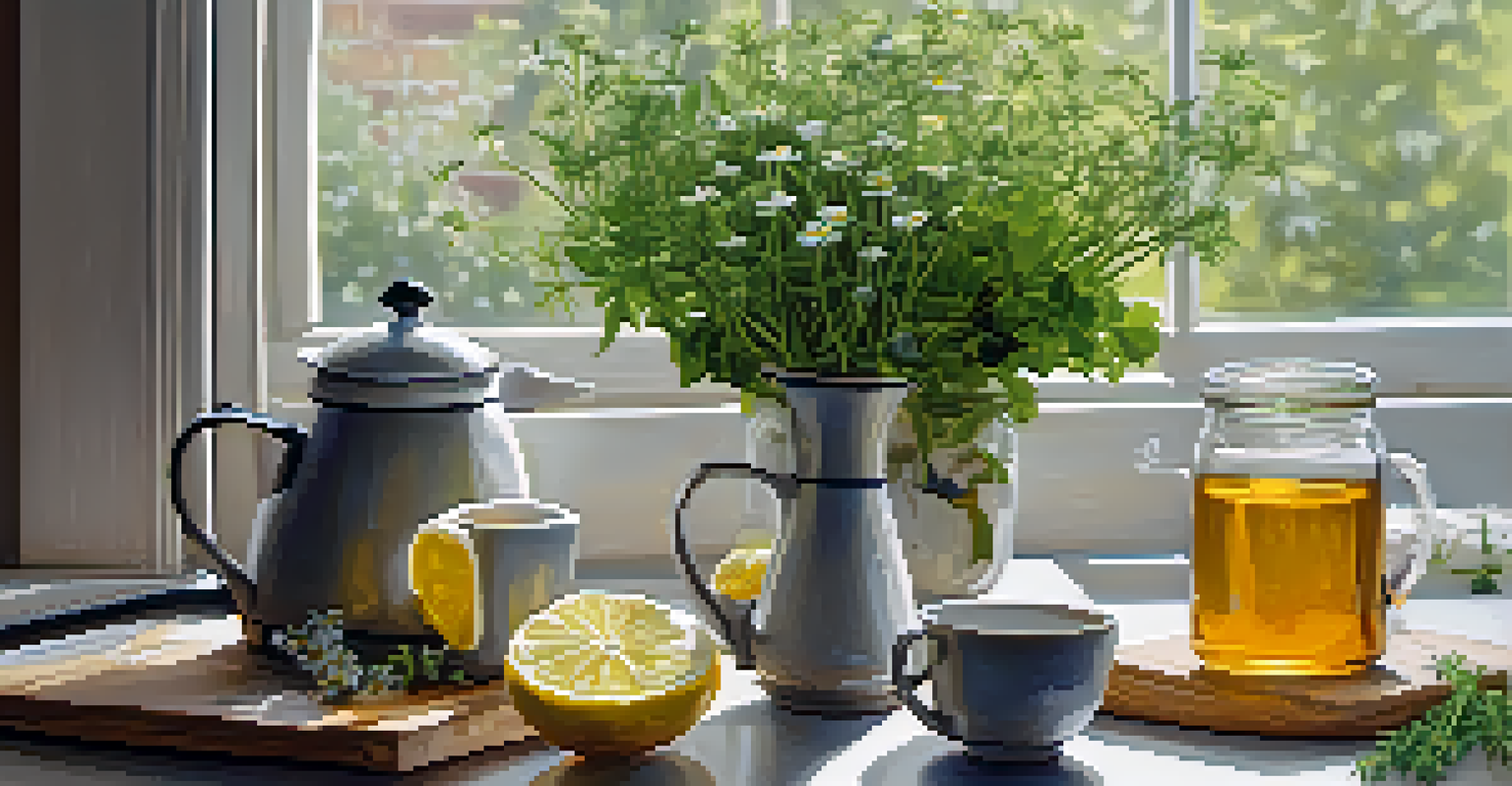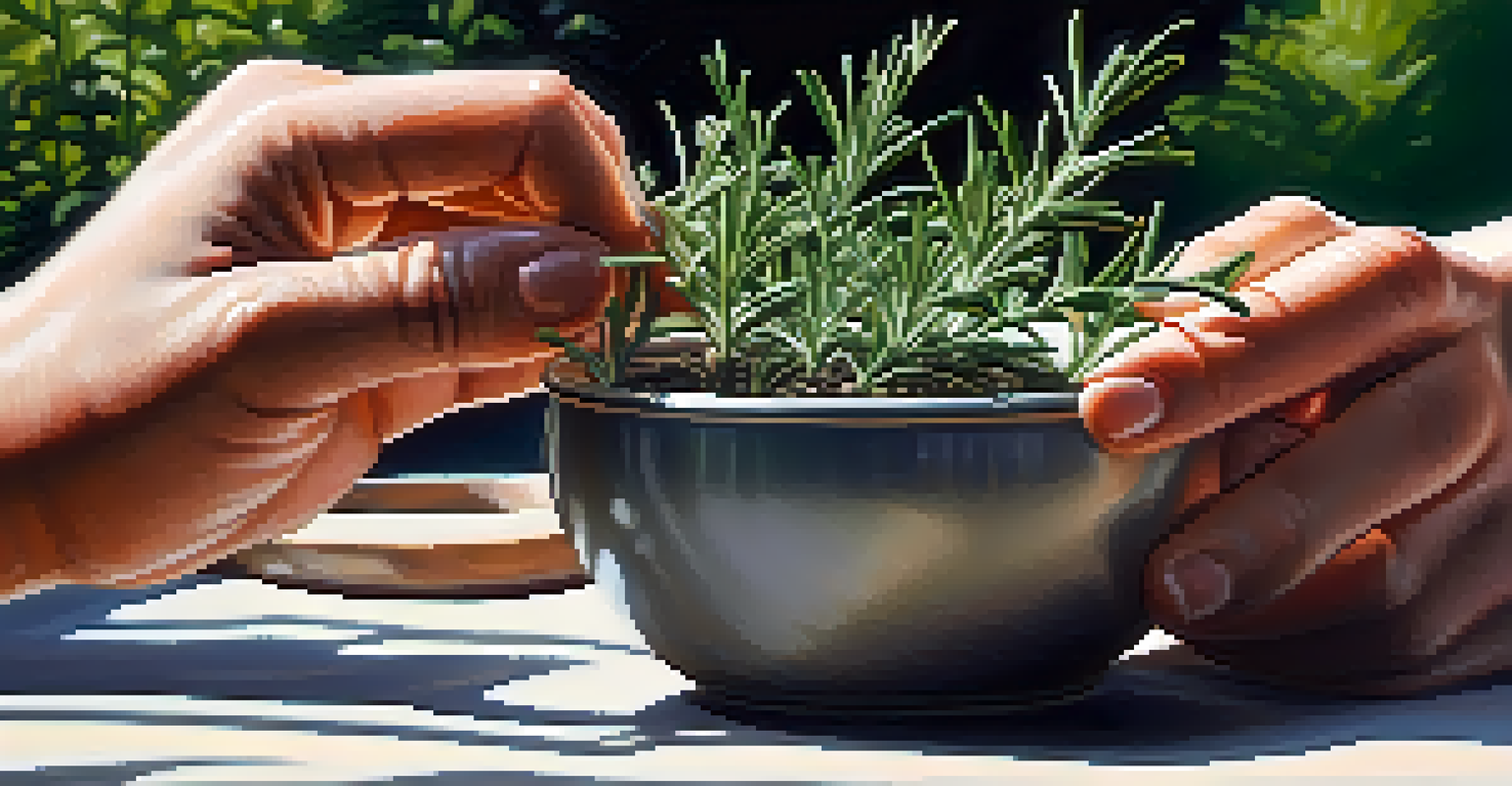The Power of Herbs: Vegan Ingredients for Mental Wellness

Understanding Mental Wellness and Its Importance
Mental wellness is a crucial aspect of overall health, influencing how we think, feel, and interact with others. It encompasses our emotional, psychological, and social well-being, affecting everything from stress management to relationships. Just like physical health, nurturing our mental wellness requires attention and care.
Herbs are the friends of the physician and the pride of the cook.
In our fast-paced world, stress and anxiety can often feel overwhelming. A proactive approach to mental wellness can help us find balance and resilience against these challenges. This is where natural solutions, particularly herbs, come into play as valuable allies in our journey toward mental clarity.
By integrating herbal remedies into our daily routines, we can harness their natural properties to support our mental health. These plants offer a holistic way to enhance our well-being and can be easily incorporated into a vegan lifestyle.
Herbs: Nature's Gift for Mental Clarity
Several herbs are renowned for their ability to enhance mental clarity and cognitive function. For instance, ginkgo biloba has been used for centuries to improve memory and concentration. This ancient herb helps increase blood flow to the brain, which can lead to sharper thinking and better focus.

Another powerful herb is rosemary, often linked to improved memory retention. The aroma of rosemary has been shown to stimulate the brain, making it a fantastic addition to your study or work environment. Whether used in cooking or as an essential oil, rosemary can help keep your mind alert and engaged.
Herbs Promote Mental Wellness
Incorporating herbs into daily routines can significantly support mental clarity and emotional well-being.
Incorporating these herbs into your daily routine could be as simple as brewing a cup of herbal tea or adding them to your meals. By doing so, you not only enrich your dishes but also support your mental clarity naturally.
Adaptogens: Herbs for Stress Relief
Adaptogens are a unique class of herbs that help the body adapt to stress and promote balance. One popular adaptogen is ashwagandha, known for its ability to reduce anxiety and enhance mood. This herb helps regulate cortisol levels, the hormone associated with stress, allowing you to navigate life's challenges more calmly.
The greatest wealth is health.
Another well-known adaptogen is rhodiola rosea, which can boost your energy and stamina while reducing fatigue. It’s often used by those seeking a natural way to combat stress and improve mental resilience. Incorporating rhodiola into your routine can help you feel more energized and focused, even on tough days.
These adaptogens can be taken in various forms, including capsules, powders, or teas. Embracing these herbs can provide a natural shield against the pressures of daily life, fostering a more balanced state of mind.
Herbs for Mood Enhancement: A Natural Approach
Certain herbs are particularly effective at uplifting mood and promoting emotional well-being. St. John's Wort is one such herb, often used to combat mild depression and anxiety. Its natural compounds work to enhance serotonin levels, which can contribute to a more positive outlook on life.
Another herb worth mentioning is lemon balm, known for its calming effects. This fragrant herb can help reduce feelings of stress and promote relaxation, making it a great addition to your evening routine. Sipping lemon balm tea before bedtime can help ease your mind and prepare you for restful sleep.
Adaptogens Aid Stress Management
Adaptogens like ashwagandha and rhodiola help the body adapt to stress, enhancing mood and resilience.
Integrating these mood-enhancing herbs into your diet can be as simple as adding them to smoothies or herbal infusions. By doing so, you can create a supportive environment for your emotional health naturally.
The Role of Herbal Teas in Mental Wellness
Herbal teas are not only comforting but also a fantastic way to incorporate mental wellness-supporting herbs into your routine. Teas made from chamomile, for example, can help soothe anxiety and promote relaxation. Sipping on a warm cup of chamomile tea can create a calming ritual to unwind after a long day.
Peppermint tea is another great choice, known for its invigorating properties. It can help clear your mind and improve focus, making it ideal for when you need a mental boost. The refreshing flavor and aroma can also add a delightful touch to your daily hydration.
Experimenting with different herbal tea blends allows you to discover what works best for you. By making herbal teas a part of your daily life, you not only enjoy their flavors but also reap the mental wellness benefits they offer.
Incorporating Herbs into Your Vegan Diet
Integrating herbs into a vegan diet can be both enjoyable and beneficial for mental wellness. Start by adding fresh herbs like basil, cilantro, and parsley to your salads, soups, and smoothies. These flavorful additions not only enhance taste but also provide various health benefits.
Herbs can also be used as natural flavor enhancers in vegan dishes, reducing the need for excessive salt or processed ingredients. For example, using herbs like thyme or oregano can elevate the taste of roasted vegetables while supporting your mental well-being.
Mindfulness Enhances Herbal Benefits
Engaging in mindfulness practices, such as herbal gardening, deepens the connection between nature and mental health.
By consciously including a variety of herbs in your meals, you can create a vibrant and healthful vegan diet that nourishes both body and mind. It's a simple yet effective way to prioritize your mental wellness.
Mindfulness and Herbal Practices for Wellness
Mindfulness practices can be enhanced through the use of herbs, offering a holistic approach to mental wellness. Engaging in activities like herbal gardening can be a therapeutic way to connect with nature. Tending to plants not only provides a sense of accomplishment but also encourages mindfulness and relaxation.
Additionally, creating herbal-infused oils or tinctures can be a meditative process. Focusing on the scents, textures, and colors of the herbs can ground you in the present moment, fostering a deeper connection to your mental health journey.

Incorporating mindfulness with herbal practices allows you to embrace a more intentional way of living. This combination can empower you to take charge of your mental wellness while enjoying the therapeutic benefits of nature.